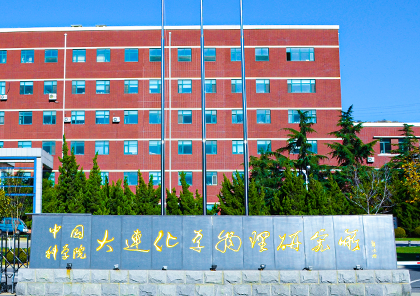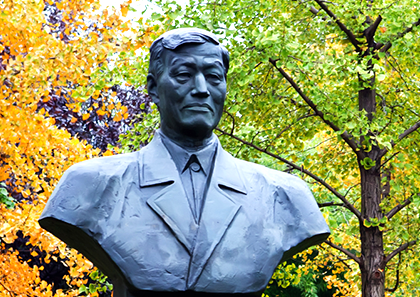


The Dalian Institute of Chemical Physics (DICP) is located in the port city of Dalian, China. In the past half century, research at DICP has closely reflected the economic and scientific needs of China. The Institute has built up an impressive portfolio of achievements, principally in the fields of catalysis, chemical engineering, chemical lasers, chemical dynamics, organic synthesis, and chromatography for modern analytic chemistry and biotechnology. These achievements have greatly contributed to the China's economic and technological development.
Research at DICP is now focused on energy-related topics, and the Institute's current development strategy is summarized as follows: "DICP focuses on sustainable energy research and coordinates the development of environment optimization, biotechnology and advanced material in a multidisciplinary atmosphere by strengthening technological integration and innovation. DICP aims to play an indispensable roles in the national economy and security, and become a leading research institute in the world."
Since its founding, DICP has produced numerous outstanding scientists and high-quality engineers who have developed both strong domestic and international reputations. A total of 26 DICP scientists have been elected to the members of Chinese Academy of Sciences and the members of Chinese Academy of Engineering (CAE), four to the members of World Academy of Sciences, one to the member of Academia European, one to the International Fellow of the Canadian Academy of Engineering, and one to the Foreign Member of the Royal Society (UK). DICP has over 1,900 employees, 1,629 graduate students as of December 2024.
Through the efforts of the scientists, staff, and students, scientific research and competitive capacities at DICP continue to grow, the strategic plan continues to improve, collaborations continue to expand, and dedicated research programs continue to influence their fields. The quality of the basic research at DICP is reflected in the number of publications in high-level journals and patents and valuable technologies for industry that are continually developed at the Institute. At the same time, DICP's innovative research for national security has received numerous commendations. By 2024, DICP have received 94 national awards for science and technology (S&T).
In 1999, Former President JIANG Zemin gave an on-site appraisal of DICP and directed the Institute to "carry out the Knowledge Innovation Program (KIP) and make DICP as a leading institution in the world." In 2002, Former President HU Jintao also gave an on-site appraisal, encouraging the Institute to "continue to strive for technological and scientific advances, to fully adopt the spirit of innovation, to advance the Knowledge Innovation Program, to generate greater progress in science and technology and human resources, and to make important contributions to China's scientific, economic, and societal development."
Over the past more than 70 years, DICP has not only produced a certain number of high learned senior scientists, renowned and influential in both China and overseas, but also turned out many middle-aged and young scientists with accomplishments, promising in their own fields and emerging as the leaders and backbones in different disciplines.
Education has always been paid more attention in DICP, which has had graduate programs since 1955. At present, it is accredited to award PhD and M.S degrees in atomic and molecular physics, optics, physical chemistry, organic chemistry, analytical chemistry, materials physics and chemistry, chemical engineering, environmental science and engineering, biochemical engineering and industrial catalysis.
The institute has 227 PhD supervisors, and also 957 PhD students, 664 master students and 44 international students by the December of 2024. There have been chemistry and chemical engineering post-doctor stations since the post-doctor station was set up in 1986. A 18-storey building, the Education Center for Graduate Study, has been opened to provide modern and advanced teaching facilities as well as comfortable accommodation and apartments for graduate students. This will ameliorate the educational facilities of the institute.
-
 1949Founding Year
1949Founding Year -
 12CAS/CAE Academicians
12CAS/CAE Academicians -
 1,860Faculties and staffs
1,860Faculties and staffs -
 1,629Students
1,629Students -
 325Postdoctoral Fellows
325Postdoctoral Fellows -
 5Campus
5Campus -
 94National Awards
94National Awards -
 3,804Patents
3,804PatentsThe past five years
-
 8,100SCI Papers
8,100SCI PapersThe past five years
-
 24Laboratories/Divisions
24Laboratories/Divisions
Last update: Dec. 2024